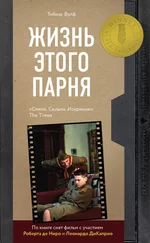Тобиас Вулф - The Liar
Здесь есть возможность читать онлайн «Тобиас Вулф - The Liar» весь текст электронной книги совершенно бесплатно (целиком полную версию без сокращений). В некоторых случаях можно слушать аудио, скачать через торрент в формате fb2 и присутствует краткое содержание. Жанр: Проза, на английском языке. Описание произведения, (предисловие) а так же отзывы посетителей доступны на портале библиотеки ЛибКат.
- Название:The Liar
- Автор:
- Жанр:
- Год:неизвестен
- ISBN:нет данных
- Рейтинг книги:3 / 5. Голосов: 1
-
Избранное:Добавить в избранное
- Отзывы:
-
Ваша оценка:
- 60
- 1
- 2
- 3
- 4
- 5
The Liar: краткое содержание, описание и аннотация
Предлагаем к чтению аннотацию, описание, краткое содержание или предисловие (зависит от того, что написал сам автор книги «The Liar»). Если вы не нашли необходимую информацию о книге — напишите в комментариях, мы постараемся отыскать её.
The Liar — читать онлайн бесплатно полную книгу (весь текст) целиком
Ниже представлен текст книги, разбитый по страницам. Система сохранения места последней прочитанной страницы, позволяет с удобством читать онлайн бесплатно книгу «The Liar», без необходимости каждый раз заново искать на чём Вы остановились. Поставьте закладку, и сможете в любой момент перейти на страницу, на которой закончили чтение.
Интервал:
Закладка:
One night a bear came into our camp just after dinner. Mother had made a tuna casserole and it must have smelled to him like something worth dying for. He came into the camp while we were sitting around the fire and stood swaying back and forth. My brother Michael saw him first and elbowed me, then my sisters saw him and screamed. Mother and Father had their backs to him but Mother must have guessed what it was because she immediately said, “Don’t scream like that. You might frighten him and there’s no telling what he’ll do. We’ll just sing and he’ll go away.”
We sang “Row Row Row Your Boat” but the bear stayed. He circled us several times, rearing up now and then on his hind legs to stick his nose into the air. By the light of the fire I could see his doglike face and watch the muscles roll under his loose skin like rocks in a sack. We sang harder as he circled us, coming closer and closer. “All right,” Mother said, “enough’s enough.” She stood abruptly. The bear stopped moving and watched her. “Beat it,” Mother said. The bear sat down and looked from side to side. “Beat it,” she said again, and leaned over and picked up a rock.
“Margaret, don’t,” my father said.
She threw the rock hard and hit the bear in the stomach. Even in the dim light I could see the dust rising from his fur. He grunted and stood to his full height. “See that?” Mother shouted: “He’s filthy. Filthy!” One of my sisters giggled. Mother picked up another rock. “Please, Margaret,” my father said. Just then the bear turned and shambled away. Mother pitched the rock after him. For the rest of the night he loitered around the camp until he found the tree where we had hung our food. He ate it all. The next day we drove back to the city. We could have bought more supplies in the valley, but Father wanted to go and would not give in to any argument. On the way home he tried to jolly everyone up by making jokes, but Michael and my sisters ignored him and looked stonily out the windows.
Things were never easy between my mother and me, but I didn’t underestimate her. She underestimated me. When I was little she suspected me of delicacy, because I didn’t like being thrown into the air, and because when I saw her and the others working themselves up for a roughhouse I found somewhere else to be. When they did drag me in I got hurt, a knee in the lip, a bent finger, a bloody nose, and this too Mother seemed to hold against me, as if I arranged my hurts to get out of playing.
Even things I did well got on her nerves. We all loved puns except Mother, who didn’t get them, and next to my father I was the best in the family. My specialty was the Swifty—” ‘You can bring the prisoner down,’ said Tom condescendingly.” Father encouraged me to perform at dinner, which must have been a trial for outsiders. Mother wasn’t sure what was going on, but she didn’t like it.
She suspected me in other ways. I couldn’t go to the movies without her examining my pockets to make sure I had enough money to pay for the ticket. When I went away to camp she tore my pack apart in front of all the boys who were waiting in the bus outside the house. I would rather have gone without my sleeping bag and a few changes of underwear, which I had forgotten, than be made such a fool of. Her distrust was the thing that made me forgetful.
And she thought I was cold-hearted because of what happened the day my father died and later at his funeral. I didn’t cry at my father’s funeral, and showed signs of boredom during the eulogy, fiddling around with the hymnals. Mother put my hands into my lap and I left them there without moving them as though they were things I was holding for someone else. The effect was ironical and she resented it. We had a sort of reconciliation a few days later after I closed my eyes at school and refused to open them. When several teachers and then the principal failed to persuade me to look at them, or at some reward they claimed to be holding, I was handed over to the school nurse, who tried to pry the lids open and scratched one of them badly. My eye swelled up and I went rigid. The principal panicked and called Mother, who fetched me home. I wouldn’t talk to her, or open my eyes, or bend, and they had to lay me on the back seat and when we reached the house Mother had to lift me up the steps one at a time. Then she put me on the couch and played the piano to me all afternoon. Finally I opened my eyes. We hugged each other and I wept. Mother did not really believe my tears, but she was willing to accept them because I had staged them for her benefit.
My lying separated us, too, and the fact that my promises not to lie anymore seemed to mean nothing to me. Often my lies came back to her in embarrassing ways, people stopping her in the street and saying how sorry they were to hear that. No one in the neighborhood enjoyed embarrassing Mother, and these situations stopped occurring once everybody got wise to me. There was no saving her from strangers, though. The summer after Father died I visited my uncle in Redding and when I got back I found to my surprise that Mother had come to meet my bus. I tried to slip away from the gentleman who had sat next to me but I couldn’t shake him. When he saw Mother embrace me he came up and presented her with a card and told her to get in touch with him if things got any worse. She gave him his card back and told him to mind his own business. Later, on the way home, she made me repeat what I had said to the man. She shook her head. “It’s not fair to people,” she said, “telling them things like that. It confuses them.” It seemed to me that Mother had confused the man, not I, but I didn’t say so. I agreed with her that I shouldn’t say such things and promised not to do it again, a promise I broke three hours later in conversation with a woman in the park.
It wasn’t only the lies that disturbed Mother; it was their morbidity. This was the real issue between us, as it had been between her and my father. Mother did volunteer work at Children’s Hospital and St. Anthony’s Dining Hall, collected things for the St. Vincent de Paul Society. She was a lighter of candles. My brother and sisters took after her in this way. My father was a curser of the dark. And he loved to curse the dark. He was never more alive than when he was indignant about something. For this reason the most important act of the day for him was the reading of the evening paper.
Ours was a terrible paper, indifferent to the city that bought it, indifferent to medical discoveries — except for new kinds of gases that made your hands fall off when you sneezed — and indifferent to politics and art. Its business was outrage, horror, gruesome coincidence. When my father sat down in the living room with the paper Mother stayed in the kitchen and kept the children busy, all except me, because I was quiet and could be trusted to amuse myself. I amused myself by watching my father.
He sat with his knees spread, leaning forward, his eyes only inches from the print. As he read he nodded to himself. Sometimes he swore and threw the paper down and paced the room, then picked it up and began again. Over a period of time he developed the habit of reading aloud to me. He always started with the society section, which he called the parasite page. This column began to take on the character of a comic strip or a serial, with the same people showing up from one day to the next, blinking in chiffon, awkwardly holding their drinks for the sake of Peninsula orphans, grinning under sunglasses on the deck of a ski hut in the Sierras. The skiers really got his goat, probably because he couldn’t understand them. The activity itself was inconceivable to him. When my sisters went to Lake Tahoe one winter weekend with some friends and came back excited about the beauty of the place, Father calmed them right down. “Snow,” he said, “is overrated.”
Читать дальшеИнтервал:
Закладка:
Похожие книги на «The Liar»
Представляем Вашему вниманию похожие книги на «The Liar» списком для выбора. Мы отобрали схожую по названию и смыслу литературу в надежде предоставить читателям больше вариантов отыскать новые, интересные, ещё непрочитанные произведения.
Обсуждение, отзывы о книге «The Liar» и просто собственные мнения читателей. Оставьте ваши комментарии, напишите, что Вы думаете о произведении, его смысле или главных героях. Укажите что конкретно понравилось, а что нет, и почему Вы так считаете.






